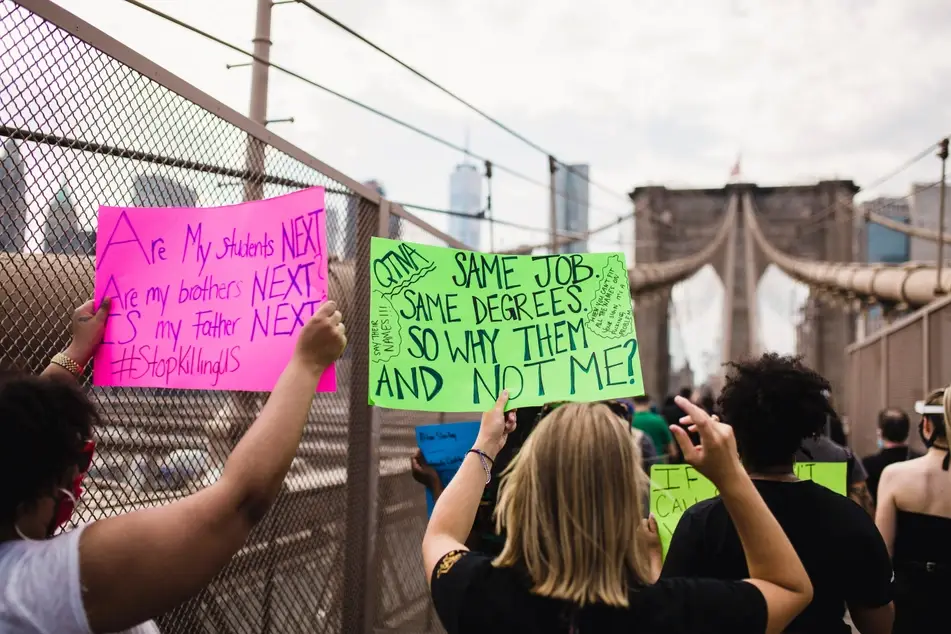How to Be a Better Ally at Work

Protests in the U.S. and around the world have forced people to think about how they can contribute to the cause of racial justice and equality. One particularly prevalent point of discussion has been around allyship: What does it mean to be an ally? How can we be better allies to the marginalized voices amongst us? How can we be stronger advocates for the causes we champion?
And true allyship isn’t just a concept for protests. Continue reading to learn what allyship is, and what that looks like in the workplace.
What is allyship?
An ally is someone who is not a member of a marginalized group, but who supports inclusion through stated values and positive action for everyone’s benefit. Allyship is characterized by:
- Relationships with BIPOC, LGBTQ+, and other marginalized groups that are based on accountability, consistency, and trust; and
- Efforts that are recognized by the marginalized groups you choose to ally with.
The terms of your engagement
The second characteristic of allyship is particularly important to keep in mind: you can call yourself an ally, but your allyship—words and deeds—need to be recognized by the group or groups you are choosing to support. The first step to being an ally, then, is choosing how to show your support.
Some causes, like racial justice, can seem overwhelming in their scope—there’s so much work that needs to be done to enact social progress that it’s easy to feel like your voice does not matter. But your voice does matter, and it can be most effective when you figure out how a large goal, like racial equality, overlaps with another issue you already support. For example, if you are passionate about mental health, you can donate to or volunteer with organizations that provide mental health services and resources to a marginalized community.
Whether or not you earn the label “ally,” you can choose how you want to show up and embody what allyship means to spread awareness and be part of the change your community needs.
Being an ally at work
Now that you know what allyship looks like in the world, it may feel harder to be an ally in the workplace. How can we be allies at work despite fears we may have of ruffling feathers or, in the absolute worst case, losing our jobs?
Being an ally means supporting a culture of inclusion in every arena you are in. And given how much time we spend in the office or doing work, it’s essential that we use our voice and action to foster more inclusion in those spaces.
Journalist and radio producer Stephanie Foo tells us tells us how:
- Pay attention to whether you are a person of privilege in your workplace. Privilege can be defined by your race, gender, or class, or by any favoritism extended your way. If you are in a position of privilege, you can make a potential positive impact by using your voice to support marginalized voices around you.
- Be respectful to everyone. Whether or not you directly work with someone, be respectful of other peoples’ identities, roles, and time. For example, learn the correct gender pronouns your co-workers use and be careful of vague, irrelevant language that reinforces stereotypes (e.g. “likeable” for women, “articulate” for Black people).
- Show your support for others’ ideas and work. In meetings, acknowledge the contributions of people who hold less privilege than yourself and actively invite them to participate. For instance, clearly point out good ideas or include marginalized co-workers in meetings and conversations by asking for their opinions.
- Clearly give credit where it’s due. If a marginalized co-worker contributed to your work or a project in any way, openly acknowledge it.
- Talk about your salary. Salary transparency is important for negotiations, especially for marginalized co-workers who can then ensure pay parity.
- Mentor marginalized people if you hold a position of power.
- Don’t condone bad behavior. If you see a marginalized co-worker being harassed, intervene in any way you can. Find a way to distract the harasser to defuse the situation or mediate. Take the time to check in with your co-worker and, if the situation calls for HR intervention, offer your support.
Recommended reading
The cornerstone of allyship is empathy, so it’s important to keep educating yourself on the history, issues, and possible solutions that are relevant to promoting inclusion and equality.
Here are some books to add to your summer reading list to get started:
- Stamped from the Beginning by Ibram X. Kendi
- Why I’m No Longer Talking to White People About Race by Reni Eddo-Lodge
- The New Jim Crow by Michelle Alexander
- The Fire Next Time by James Baldwin
- Good Talk by Mira Jacob
***
Have you been thinking more about your role as an ally? Or do you have advice for others? Share with us on Facebook.
Nisha Kumar Kulkarni is a writer and creative coach in New York City. She helps women living with chronic illness and mental health challenges to pursue their passion projects without compromising their health.


